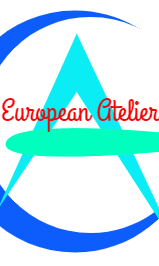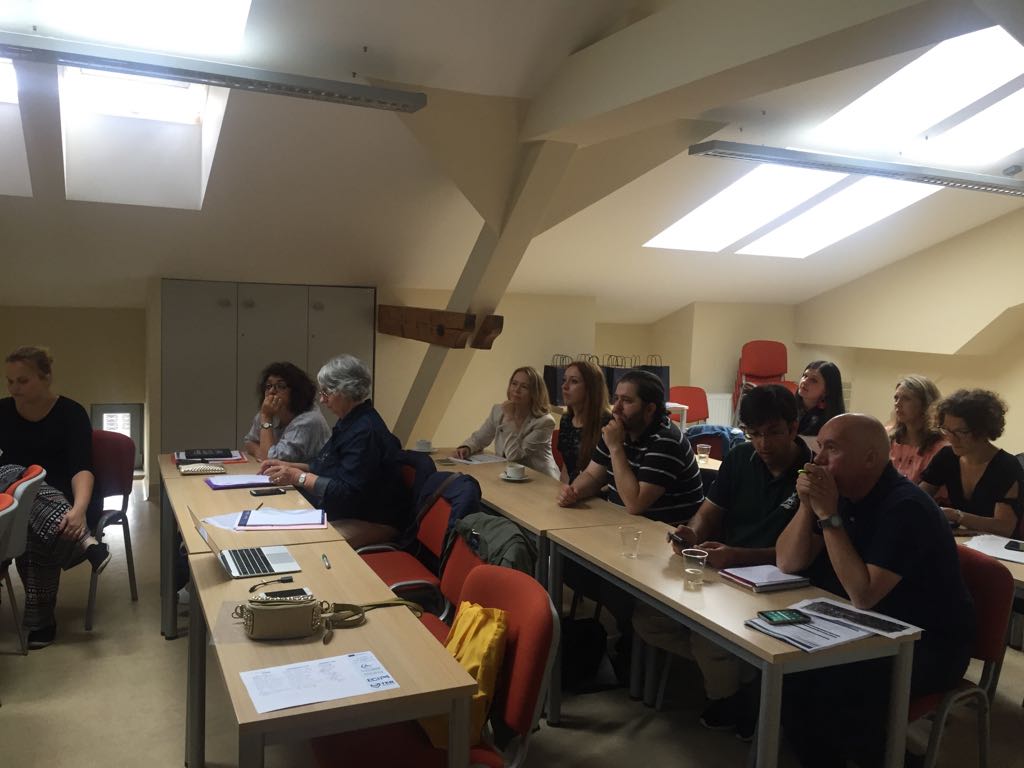Depositary of the ultra twenty year experience concerning professional training, Ecipa meets the 12th and the 13th july in Poznan the partner of Atelier of crafts project, financed inside the Erasmus+ program.
How to teach these jobs to the youngsters?
This is the question at the base of the project which has found its answer in Spain during the meeting among the trainers from the 14th to the 20th of May at the JOSÉ LUIS CASTILLO-PUCHE school in Yecla.
Teachers, coordinators, professional education trainees coming from Latvia (RIGA ART AND MEDIA SCHOOL), Poland (TEB Edukacja), Spain (IES Castillo-Puche) and Italy (Ecipa) have worked together seven days to identify good practices and write together the model for a successful professional training.
What is the winning method to teach a craft? What are the points of reference to transfer knowledges in fields like wellness and beauty, design and art craft, graphic and web design?
The model considers a type of participated training between peers based on mutual learning both methodological and operative.
The professional school to learn a craft is today that one which respects the learning styles and take into consideration the technological innovation. A professional school in syntony with the job market.
Each partner has actively contributed to the creation of the educational model which will be tested in November in Perugia when almost 70 youngsters from different european countries will experiment it.
Trainers have identified the key factors of a successful professional training where the mix theory-laboratory-experience work, is well calibrated to acquire technical-professional knowledges and prepare the learners to the craft.
The shared model learner centered identifies in the 3 H (head, hands, heart) the criteria to transfer and evaluate the educational process in its completeness.
A model which identifies in all the training actors (firstly the same learner, then the trainers and the company) the evaluators of all the process and the results in terms of competences.
The meeting among trainers has been characterized by an accurate study on all the typical aspects in the VET field (Professional Training) and a resolute will to take part in the promotion of the craft process has emerged: that is to say quality, creativity and know-how. Inside this process, affected by the economic crisis and the technological revolution, the craft values simply hide themselves together with both the training of the person and that of the worker.
At the centre of the training activity once more the learning by doing methodology shared by everyone and proved also by the skype intervention, made thanks to the
Chambre de métiers et de l’artisanat du Rhone (french partner of the project), of Mr. Gilbert Bessac, president of l’Eveil aux Métiers (http://www.eveilauxmetiers-lyon.org): an excellent example of orientation and awareness towards the hand-crafted work which involves retired artisans who guide laboratories with youngsters between 10 and 14 years old.
In Poland will be decided periods and ways to test the model. In november youngsters coming from all Europe will attend classes at the Scuola dei Mestieri in Ecipa and will do a work experience at some umbrian companies. An excellent occasion to improve educational methodologies, exchange good practices and open to interculturality and innovation.
The project is financed in the Erasmus+ Program.
For further information please go to our websites www.ecipaumbria.it and www.atelierofcrafts.com
Depositaria dell’esperienza ultraventennale in tema di formazione professionale, Ecipa incontra il 12 e 13 luglio a Poznan i partner del progetto Atelier of Crafts, finanziato nell’ambito del programma Erasmus +
Come insegnare i mestieri ai giovani?
Questo è l’interrogativo che muove il progetto, che ha trovato la risposta in Spagna durante il meeting tra formatori che si è svolto da 14 al 20 maggio presso l’Istituto Scolastico JOSÉ LUIS CASTILLO-PUCHE di Yecla.
Docenti, coordinatori, esperti di formazione professionale, provenienti da Lettonia (RIGA ART AND MEDIA SCHOOL), Polonia (TEB Edukacja), Spagna (IES Cstillo-Puche) e Italia (Ecipa) hanno lavorato insieme sette giorni per individuare le buone prassi e scrivere a più mani il modello per la formazione professionale di successo.
Quale è il metodo vincente per insegnare un mestiere? Quali sono i punti di riferimento per trasferire competenze nei settori: wellness and beauty, design and art craft, graphic and web design?
Il modello prevede un tipo di formazione partecipata tra pari fondata sullo scambio di conoscenze ed esperienze e sull’apprendimento reciproco sia metodologico che operativo.
La scuola professionale per apprendere un mestiere, oggi, è quella che rispetta gli stili di apprendimento e tiene conto dell’innovazione tecnologica. Una Scuola professionalizzante in sintonia con il mercato del lavoro.
Ogni partner ha contribuito attivamente alla creazione del modello formativo da testare in novembre a Perugia, quando circa 70 ragazzi provenienti dai vari paesi europei lo sperimenteranno.
I formatori hanno individuato i fattori chiave di una formazione professionale di successo, dove il mix teoria-laboratorio-esperienza lavoro, è ben calibrato per acquisire competenze tecnico-professionali e preparare i discenti al lavoro.
Il modello condiviso centrato sul discente (learner centered) individua nelle 3 acca (head, hands, heart), ovvero testa, mani e cuore, i criteri per trasferire e valutare il processo formativo nella sua completezza. Un modello che individua in tutti gli attori della formazione (in primis lo stesso discente, i formatori e l’impresa) i valutatori di tutto il processo e degli esiti in termini di competenze.
L’incontro dei tecnici è stato caratterizzato da un’indagine accurata di tutti gli aspetti che contraddistinguono l’ambito VET (Formazione Professionale) ed è emersa la ferma volontà di partecipare al processo di valorizzazione dell’Artigianato, nel concetto più ampio e alto, vale a dire quello che rimanda a qualità, creatività e perizia. Dentro al quale, al netto di crisi economica e rivoluzione tecnologica, si nascondono i valori che contraddistinguono il lavoro, tout court, e la formazione della persona, oltre che quella del lavoratore.
Al centro dell’attività formativa ancora una volta condivisa da tutti la metodologia del learaning by doing, testimoniata anche dall’intervento skype, realizzato grazie alla Chambre de métiers et de l’artisanat du Rhone (partner francese del progetto), del Sig. Gilbert Baissac, presidente di L’Eveil aux Métiers (http://www.eveilauxmetiers-lyon.org): un ottimo esempio di orientamento e sensibilizzazione al lavoro artigiano, che vede coinvolti artigiani in pensione che guidano laboratori con ragazzi di età età tra i 10-14 anni.
In Polonia verranno decisi tempi e modalità per testare il modello. A novembre ragazzi provenienti da tutta Europa verranno a lezione alla Scuola dei Mestieri di Ecipa e faranno un’esperienza lavoro presso le imprese umbre. Un’ottima occasione per affinare metodologie didattiche, scambiare buone prassi e aprirsi ad interculturalità e innovazione.
Il progetto è finanziato nell’ambito del Programma Erasmus+, per informazioni potete rivolgervi ad Ecipa Umbria www.ecipaumbria.it, www.atelierofcrafts.com


